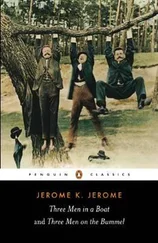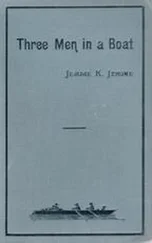Jerome Jerome - Three Men in a Boat (To Say Nothing of the Dog)
Здесь есть возможность читать онлайн «Jerome Jerome - Three Men in a Boat (To Say Nothing of the Dog)» — ознакомительный отрывок электронной книги совершенно бесплатно, а после прочтения отрывка купить полную версию. В некоторых случаях можно слушать аудио, скачать через торрент в формате fb2 и присутствует краткое содержание. Жанр: Юмористическая проза, Классическая проза, на английском языке. Описание произведения, (предисловие) а так же отзывы посетителей доступны на портале библиотеки ЛибКат.
- Название:Three Men in a Boat (To Say Nothing of the Dog)
- Автор:
- Жанр:
- Год:неизвестен
- ISBN:нет данных
- Рейтинг книги:3 / 5. Голосов: 1
-
Избранное:Добавить в избранное
- Отзывы:
-
Ваша оценка:
- 60
- 1
- 2
- 3
- 4
- 5
Three Men in a Boat (To Say Nothing of the Dog): краткое содержание, описание и аннотация
Предлагаем к чтению аннотацию, описание, краткое содержание или предисловие (зависит от того, что написал сам автор книги «Three Men in a Boat (To Say Nothing of the Dog)»). Если вы не нашли необходимую информацию о книге — напишите в комментариях, мы постараемся отыскать её.
Three Men in a Boat (To Say Nothing of the Dog) — читать онлайн ознакомительный отрывок
Ниже представлен текст книги, разбитый по страницам. Система сохранения места последней прочитанной страницы, позволяет с удобством читать онлайн бесплатно книгу «Three Men in a Boat (To Say Nothing of the Dog)», без необходимости каждый раз заново искать на чём Вы остановились. Поставьте закладку, и сможете в любой момент перейти на страницу, на которой закончили чтение.
Интервал:
Закладка:
And so, with sentinel in each dark street, and twinkling watch-fires on each height around, the night has worn away, and over this fair valley of old Thame has broken the morning of the great day that is to close so big with the fate of ages yet unborn.
Ever since grey dawn, in the lower of the two islands, just above where we are standing, there has been great clamour, and the sound of many workmen. The great pavilion brought there yester eve is being raised, and carpenters are busy nailing tiers of seats, while `prentices from London town are there with many-coloured stuffs and silks and cloth of gold and silver.
And now, lo! down upon the road that winds along the river's bank from Staines there come towards us, laughing and talking together in deep guttural bass, a half-a-score of stalwart halbert-men-Barons' men, these-and halt at a hundred yards or so above us, on the other bank, and lean upon their arms, and wait.
And so, from hour to hour, march up along the road ever fresh groups and bands of armed men, their casques and breastplates flashing back the long low lines of morning sunlight, until, as far as eye can reach, the way seems thick with glittering steel and prancing steeds. And shouting horsemen are galloping from group to group, and little banners are fluttering lazily in the warm breeze, and every now and then there is a deeper stir as the ranks make way on either side, and some great Baron on his war-horse, with his guard of squires around him, passes along to take his station at the head of his serfs and vassals.
And up the slope of Cooper's Hill, just opposite, are gathered the wondering rustics and curious townsfolk, who have run from Staines, and none are quite sure what the bustle is about, but each one has a different version of the great event that they have come to see; and some say that much good to all the people will come from this day's work; but the old men shake their heads, for they have heard such tales before.
And all the river down to Staines is dotted with small craft and boats and tiny coracles-which last are growing out of favour now, and are used only by the poorer folk. Over the rapids, where in after years trim Bell Weir lock will stand, they have been forced or dragged by their sturdy rowers, and now are crowding up as near as they dare come to the great covered barges, which lie in readiness to bear King John to where the fateful Charter waits his signing.
It is noon, and we and all the people have been waiting patient for many an hour, and the rumour has run round that slippery John has again escaped from the Barons' grasp, and has stolen away from Duncroft Hall with his mercenaries at his heels, and will soon be doing other work than signing charters for his people's liberty.
Not so! This time the grip upon him has been one of iron, and he has slid and wriggled in vain. Far down the road a little cloud of dust has risen, and draws nearer and grows larger, and the pattering of many hoofs grows louder, and in and out between the scattered groups of drawn-up men, there pushes on its way a brilliant cavalcade of gay-dressed lords and knights. And front and rear, and either flank, there ride the yeomen of the Barons, and in the midst King John.
He rides to where the barges lie in readiness, and the great Barons step forth from their ranks to meet him. He greets them with a smile and laugh, and pleasant honeyed words, as though it were some feast in his honour to which he had been invited. But as he rises to dismount, he casts one hurried glance from his own French mercenaries drawn up in the rear to the grim ranks of the Barons' men that hem him in.
Is it too late? One fierce blow at the unsuspecting horseman at his side, one cry to his French troops, one desperate charge upon the unready lines before him, and these rebellious Barons might rue the day they dared to thwart his plans! A bolder hand might have turned the game even at that point. Had it been a Richard there! the cup of liberty might have been dashed from England's lips, and the taste of freedom held back for a hundred years.
But the heart of King John sinks before the stern faces of the English fighting men, and the arm of King John drops back on to his rein, and he dismounts and takes his seat in the foremost barge. And the Barons follow in, with each mailed hand upon the sword-hilt, and the word is given to let go.
Slowly the heavy, bright-decked barges leave the shore of Runningmede. Slowly against the swift current they work their ponderous way, till, with a low grumble, they grate against the bank of the little island that from this day will bear the name of Magna Charta Island. And King John has stepped upon the shore, and we wait in breathless silence till a great shout cleaves the air, and the great cornerstone in England's temple of liberty has, now we know, been firmly laid.
CHAPTER XII
Henry VIII. AND Anne Boleyn.-Disadvantages of living in same house with pair of lovers.-A trying time for the English nation.-A night search for the picturesque.-Homeless and houseless.-Harris prepares to die.-An angel comes along.-Effect of sudden joy on Harris.-A little supper.-Lunch.-High price for mustard.-A fearful battle.-Maidenhead.-Sailing.-Three fishers.-We are cursed.
I WAS sitting on the bank, conjuring up this scene to myself, when George remarked that when I was quite rested, perhaps I would not mind helping to wash up; and, thus recalled from the days of the glorious past to the prosaic present, with all its misery and sin, I slid down into the boat and cleaned out the frying-pan with a stick of wood and a tuft of grass, polishing it up finally with George's wet shirt.
We went over to Magna Charta Island, and had a look at the stone which stands in the cottage there and on which the great Charter is said to have been signed; though, as to whether it really was signed there, or, as some say, on the other bank at "Runningmede," I decline to commit myself. As far as my own personal opinion goes, however, I am inclined to give weight to the popular island theory. Certainly, had I been one of the Barons, at the time, I should have strongly urged upon my comrades the advisability of our getting such a slippery customer as King John on to the island, where there was less chance of surprises and tricks.
There are the ruins of an old priory in the grounds of Ankerwyke House, which is close to Picnic Point, and it was round about the grounds of this old priory that Henry VIII. is said to have waited for and met Anne Boleyn. He also used to meet her at Hever Castle in Kent, and also somewhere near St. Albans. It must have been difficult for the people of England in those days to have found a spot where these thoughtless young folk were not spooning.
Have you ever been in a house where there are a couple courting? It is most trying. You think you will go and sit in the drawing-room, and you march off there. As you open the door, you hear a noise as if somebody had suddenly recollected something, and, when you get in, Emily is over by the window, full of interest in the opposite side of the road, and your friend, John Edward, is at the other end of the room with his whole soul held in thrall by photographs of other people's relatives.
"Oh!" you say, pausing at the door, "I didn't know anybody was here."
"Oh! didn't you?" says Emily, coldly, in a tone which implies that she does not believe you.
You hang about for a bit, then you say:
"It's very dark. Why don't you light the gas?"
John Edward says, "Oh!" he hadn't noticed it; and Emily says that papa does not like the gas lit in the afternoon.
You tell them one or two items of news, and give them your views and opinions on the Irish question; but this does not appear to interest them. All they remark on any subject is, "Oh!" "Is it?" "Did he?" "Yes," and "You don't say so!" And, after ten minutes of such style of conversation, you edge up to the door, and slip out, and are surprised to find that the door immediately closes behind you, and shuts itself, without your having touched it.
Читать дальшеИнтервал:
Закладка:
Похожие книги на «Three Men in a Boat (To Say Nothing of the Dog)»
Представляем Вашему вниманию похожие книги на «Three Men in a Boat (To Say Nothing of the Dog)» списком для выбора. Мы отобрали схожую по названию и смыслу литературу в надежде предоставить читателям больше вариантов отыскать новые, интересные, ещё непрочитанные произведения.
Обсуждение, отзывы о книге «Three Men in a Boat (To Say Nothing of the Dog)» и просто собственные мнения читателей. Оставьте ваши комментарии, напишите, что Вы думаете о произведении, его смысле или главных героях. Укажите что конкретно понравилось, а что нет, и почему Вы так считаете.












![Helen Rowland - The Widow [To Say Nothing of the Man]](/books/752764/helen-rowland-the-widow-to-say-nothing-of-the-man-thumb.webp)